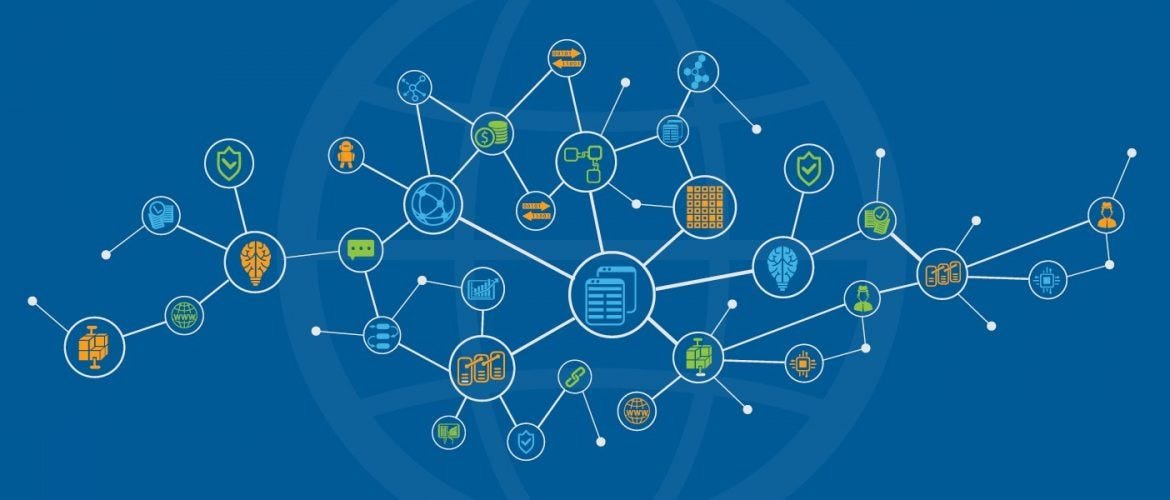In today’s rapidly evolving digital landscape, businesses are increasingly recognizing the transformative potential of distributed ledger technology. A blockchain integration consulting firm serves as your strategic partner in navigating this complex technological terrain, offering specialized expertise to seamlessly incorporate blockchain solutions into your existing business infrastructure.
The demand for professional blockchain consulting has skyrocketed, with the global blockchain technology market projected to reach $394.60 billion by 2028. Whether you’re a startup exploring decentralized applications or an enterprise seeking to enhance security and transparency, partnering with the right blockchain integration consulting firm can determine the success of your digital transformation journey. This comprehensive guide explores everything you need to know about selecting, working with, and maximizing the value of blockchain consulting services in 2025.
What Is a Blockchain Integration Consulting Firm?
A blockchain integration consulting firm specializes in helping businesses adopt and implement blockchain technology across their operations. These expert organizations provide end-to-end services, from initial strategy development to full-scale deployment and ongoing maintenance.
Unlike generic technology consultants, blockchain specialists possess deep expertise in distributed ledger technologies, smart contracts, cryptocurrency ecosystems, and decentralized application development. They understand the nuances of different blockchain platforms, including Ethereum, Hyperledger Fabric, Solana, and emerging Web3 technologies.
The primary role of these consulting firms extends beyond technical implementation. They analyze your business processes, identify optimal use cases for blockchain technology, and develop comprehensive integration strategies that align with your organizational goals and regulatory requirements.
Core Services Offered by Leading Consulting Firms
Modern blockchain consulting firms provide a comprehensive suite of services designed to address every aspect of your blockchain journey:
Strategic Planning and Feasibility Analysis: Consultants conduct thorough assessments of your current systems, identifying areas where blockchain can deliver maximum value. They evaluate technical feasibility, economic implications, and potential return on investment.
Custom Blockchain Development: From private networks to public blockchain integrations, these firms design and develop tailored solutions that meet your specific business requirements. This includes everything from consensus mechanism selection to node architecture design.
Smart Contract Development and Auditing: Expert developers create secure, efficient smart contracts that automate business processes while minimizing vulnerabilities. Professional auditing services ensure your contracts are bulletproof against potential exploits.
System Integration and Migration: Seamless integration with existing IT infrastructure is crucial for successful blockchain adoption. Consulting firms manage the complex process of connecting blockchain solutions with legacy systems, ERP platforms, and third-party applications.
Why Your Business Needs Expert Blockchain Integration Consulting
The complexity of blockchain technology presents significant challenges for organizations attempting independent implementation. Without proper guidance, businesses often encounter costly mistakes, security vulnerabilities, and integration failures that can derail entire projects.
Technical Expertise and Risk Mitigation
Professional blockchain consultants bring years of specialized experience and deep technical knowledge that internal teams typically lack. They understand the intricacies of different consensus mechanisms, know how to optimize gas fees, and can navigate the complex landscape of blockchain platforms and protocols.
Risk mitigation represents another critical advantage. Blockchain projects involve substantial financial investments and potential security risks. Experienced consultants identify and address potential vulnerabilities before they become costly problems, ensuring your implementation meets industry security standards and regulatory compliance requirements.
Accelerated Time-to-Market
Partnering with established consulting firms significantly reduces development timelines. Rather than spending months learning blockchain fundamentals and debugging implementation issues, your team can leverage proven methodologies and pre-built solutions that accelerate project delivery. These firms maintain relationships with blockchain vendors, possess libraries of tested code components and understand best practices that eliminate common development bottlenecks. This expertise translates directly into faster market entry and quicker realization of blockchain benefits.
Cost Optimization and Resource Allocation
While hiring blockchain consultants requires up-front investment, the long-term cost benefits often justify the expense. Professional guidance helps avoid expensive mistakes, reduces development iterations, and ensures optimal resource allocation throughout the project lifecycle. Consultants also provide accurate cost estimates and help organizations budget effectively for blockchain initiatives. They understand the true costs of different blockchain platforms, ongoing maintenance requirements, and scaling considerations that inexperienced teams might overlook.
Key Services Provided by Blockchain Integration Consulting Firms

Enterprise Blockchain Development
Enterprise blockchain solutions require sophisticated architecture capable of handling high transaction volumes, ensuring data privacy, and integrating with complex business systems. Leading consulting firms specialize in developing permissioned networks that meet enterprise-grade security and performance requirements. These solutions often involve hybrid blockchain architectures that combine the benefits of public and private networks. Consultants design systems that maintain transaction transparency while protecting sensitive business data, implementing advanced encryption and access control mechanisms.
DeFi and Smart Contract Solutions
Decentralized Finance (DeFi) represents one of the fastest-growing blockchain applications. Specialized consulting firms help businesses develop DeFi platforms, automated market makers, lending protocols, and yield farming mechanisms that capitalize on this emerging market. Smart contract development requires particular expertise due to the immutable nature of blockchain code. Professional consultants follow rigorous development and testing protocols, implementing comprehensive security measures that protect against common vulnerabilities like reentrancy attacks and integer overflows.
NFT Marketplace and Digital Asset Management
The non-fungible token (NFT) ecosystem continues expanding beyond digital art into practical business applications. Consulting firms help organizations develop NFT marketplaces, implement digital asset tokenization strategies, and create innovative revenue models around unique digital assets. These services include technical development, legal compliance guidance, and market strategy consulting that ensures successful NFT project launches. Consultants understand platform-specific requirements, gas optimization techniques, and user experience best practices that drive marketplace adoption.
Blockchain Security Audits and Compliance
Security represents a paramount concern in blockchain implementation. Professional consulting firms provide comprehensive security auditing services that identify vulnerabilities in smart contracts, network architecture, and integration points. Regulatory compliance adds another layer of complexity, particularly for financial services and healthcare organizations. Experienced consultants navigate evolving regulatory landscapes, ensuring blockchain implementations meet industry-specific requirements and data protection standards.
How to Choose the Right Blockchain Integration Consulting Firm
Evaluating Technical Expertise and Experience
When selecting a blockchain integration consulting firm, technical expertise should be your primary consideration. Look for organizations with proven experience across multiple blockchain platforms and demonstrated success in projects similar to yours. Review their portfolio carefully, paying attention to project complexity, industry relevance, and client outcomes.
The best consulting firms showcase detailed case studies that highlight technical challenges, solutions implemented, and measurable business results achieved. Examine their team composition and technical credentials. Top-tier firms employ certified blockchain developers, security specialists, and architects with relevant industry certifications from organizations like the Blockchain Council or ConsenSys Academy.
Industry Experience and Specialization
Different industries have unique blockchain requirements and regulatory considerations. Financial services organizations need firms experienced with compliance frameworks like KYC/AML and regulatory reporting. Healthcare companies require expertise in HIPAA compliance and patient data protection. Supply chain implementations demand an understanding of IoT integration, multi-party networks, and product traceability systems. Manufacturing organizations benefit from consultants experienced with industrial blockchain applications and enterprise resource planning integration.
Client References and Success Stories
Reputable consulting firms provide transparent access to client references and detailed success stories. Contact previous clients directly to understand their experience, project outcomes, and ongoing relationships with the consulting firm. Pay attention to long-term partnerships and repeat engagements, which indicate client satisfaction and successful project delivery. The best firms maintain ongoing relationships that extend beyond initial implementation to provide continuous optimization and support.
Development Methodology and Project Management
Successful blockchain projects require structured development methodologies and rigorous project management. Evaluate potential consulting partners’ approach to project planning, milestone tracking, and stakeholder communication. Agile development methodologies work particularly well for blockchain projects due to their iterative nature and evolving requirements. Look for firms that emphasize regular client collaboration, transparent progress reporting, and flexible adaptation to changing project needs.
Blockchain Integration Cost Considerations in 2025
Understanding Pricing Models
Blockchain integration costs vary significantly based on project complexity, with basic implementations ranging from $30,000 to $60,000, while enterprise solutions can exceed $200,000. Understanding different pricing models helps organizations budget effectively and select appropriate consulting partners.
Most consulting firms offer several pricing approaches:
Fixed-Price Projects: Suitable for well-defined projects with clear scope and deliverables. This model provides cost certainty but may limit flexibility for changing requirements.
Time and Materials: Hourly rates typically range between $25-$49 for blockchain development agencies, though specialized expertise commands premium pricing. This model offers maximum flexibility but requires careful scope management.
Retainer Agreements: Ongoing consulting relationships often use monthly retainer arrangements that provide dedicated access to expert resources while offering cost predictability for long-term projects.
Factors Affecting Implementation Costs
Several key factors significantly impact blockchain integration costs:
Project Complexity: Simple payment systems or basic smart contracts require minimal resources, while complex DeFi protocols or enterprise-wide implementations demand substantial development effort and specialized expertise.
Platform Selection: Public blockchains like Ethereum involve lower initial costs but require ongoing gas fees, while private networks have higher setup costs but offer more control.
Integration Requirements: Connecting blockchain solutions with existing enterprise systems, databases, and third-party applications adds complexity and cost to implementation projects.
Security and Compliance: Regulatory compliance requirements can add 15-30% to total project costs, particularly for financial services and healthcare organizations with strict data protection requirements.
Ongoing Maintenance and Support Costs
Blockchain implementations require continuous maintenance, security updates, and performance optimization. Annual maintenance costs typically represent 15-20% of initial development investment, covering system monitoring, security patches, and feature enhancements.
Consider these ongoing expenses when evaluating the total cost of ownership:
Infrastructure Costs: Cloud hosting, node operation, and network participation fees scale with transaction volume and system complexity.
Security Monitoring: Continuous threat monitoring and incident response capabilities are essential for production blockchain systems.
Regulatory Updates: Evolving compliance requirements may necessitate system modifications and additional legal consultation.
Top Blockchain Platforms and Technologies in 2025

Ethereum and Layer 2 Solutions
Ethereum continues dominating the blockchain landscape due to its mature ecosystem, extensive developer tools, and widespread adoption. However, network congestion and high gas fees have driven innovation in Layer 2 scaling solutions. Polygon, Arbitrum, and Optimism provide Ethereum-compatible environments with significantly reduced transaction costs and faster processing times. These platforms enable complex DeFi applications and enterprise solutions that were previously cost-prohibitive on the main Ethereum network.
Smart contract development on Ethereum has evolved significantly, with improved development frameworks like Hardhat and Foundry streamlining the development process. Professional consulting firms leverage these tools to accelerate project delivery while maintaining code quality and security standards.
Enterprise Blockchain Platforms
Hyperledger Fabric remains the preferred choice for enterprise blockchain implementations due to its permissioned network architecture, modular design, and strong governance framework. Major consulting firms specialise in Hyperledger implementations for supply chains, financial services, and government applications.
IBM Blockchain Platform and SAP Blockchain Service provide enterprise-ready solutions that integrate seamlessly with existing business systems. These platforms offer comprehensive development tools, deployment automation, and enterprise-grade support that accelerate implementation timelines.
R3 Corda specifically targets financial services with specialized features for complex financial instruments, regulatory compliance, and privacy protection. Consulting firms experienced with Corda implementations help financial institutions develop innovative blockchain applications while meeting strict regulatory requirements.
Emerging Blockchain Technologies
Solana has gained significant traction due to its high-performance architecture and low transaction costs. The platform supports complex applications with sub-second finality and minimal fees, making it attractive for gaming, social media, and high-frequency trading applications.
Polkadot’s multi-chain architecture enables interoperability between different blockchain networks, addressing one of the technology’s most significant limitations. Consulting firms leverage Polkadot’s parachain technology to develop cross-chain applications and bridge existing blockchain ecosystems.
Avalanche provides another high-performance alternative with its unique consensus mechanism and subnet architecture. The platform enables customizable blockchain networks that can be tailored to specific application requirements while maintaining interoperability with the broader Avalanche ecosystem.
Industry-Specific Blockchain Applications
Financial Services and Banking
The financial services sector continues leading blockchain adoption with applications ranging from cross-border payments to trade finance and regulatory reporting. Consulting firms help banks and financial institutions navigate complex regulatory requirements while implementing innovative blockchain solutions.
Central Bank Digital Currencies (CBDCs) represent a significant growth area, with numerous countries exploring or implementing digital versions of their national currencies. Specialized consulting firms provide expertise in CBDC architecture, privacy protection, and monetary policy implementation.
DeFi protocols are increasingly integrating with traditional financial services, creating hybrid solutions that combine blockchain innovation with regulatory compliance. Consulting firms help financial institutions develop compliant DeFi offerings that expand their service capabilities while meeting regulatory expectations.
Supply Chain and Logistics
Blockchain technology provides unprecedented transparency and traceability in supply chain operations. Consulting firms help organizations implement systems that track products from origin to consumer, enabling rapid response to quality issues and verification of sustainability claims.
IoT integration represents a key component of modern supply chain blockchain implementations. Sensors and connected devices automatically record data to blockchain networks, creating immutable records of temperature, location, and handling conditions throughout the supply chain.
Walmart, Unilever, and other major retailers have successfully implemented blockchain traceability systems that enable rapid identification of contaminated products and source verification. These implementations demonstrate the practical value of blockchain technology in improving food safety and reducing recall costs.
Healthcare and Pharmaceuticals
Healthcare blockchain applications focus primarily on secure data sharing, patient privacy protection, and pharmaceutical supply chain integrity. Consulting firms help healthcare organizations navigate HIPAA compliance requirements while implementing innovative blockchain solutions.
Clinical trial data management represents a significant opportunity for blockchain technology. Immutable record-keeping and smart contract automation can improve trial integrity, reduce fraud, and accelerate regulatory approval processes.
Pharmaceutical counterfeiting costs the industry billions annually and poses serious patient safety risks. Blockchain-based track-and-trace systems help pharmaceutical companies verify product authenticity and prevent counterfeit drugs from entering the supply chain.
Implementation of Best Practices and Common Pitfalls
Strategic Planning and Stakeholder Alignment
Successful blockchain implementations begin with comprehensive strategic planning and stakeholder alignment. Many projects fail due to unclear objectives, unrealistic expectations, or insufficient buy-in from key stakeholders. Experienced consulting firms facilitate strategic planning workshops that align technical capabilities with business objectives. They help organizations identify specific use cases where blockchain provides measurable advantages over traditional solutions.
Change management represents another critical success factor. Blockchain implementations often require significant process changes and new ways of thinking about data ownership and trust. Professional consultants provide change management support that ensures smooth organizational transitions.
Technical Architecture and Security Considerations
Blockchain architecture decisions have long-term implications for system performance, scalability, and maintenance costs. Consulting firms help organizations select appropriate consensus mechanisms, network configurations, and integration patterns that support future growth.
Security considerations extend beyond smart contract vulnerabilities to include network security, key management, and operational security practices. Professional consultants implement comprehensive security frameworks that protect against both technical and operational threats.
Disaster recovery and business continuity planning require special consideration in blockchain environments. Unlike traditional systems, blockchain networks cannot simply be restored from backups. Consulting firms help organizations develop appropriate backup and recovery strategies for blockchain implementations.
Compliance and Regulatory Considerations
Regulatory compliance adds complexity to blockchain implementations, particularly in highly regulated industries. Professional consulting firms stay current with evolving regulations and help organizations implement compliant solutions from the outset.
Data privacy regulations like GDPR present unique challenges for blockchain implementations due to the technology’s immutable nature. Consulting firms help organizations balance transparency benefits with privacy requirements through careful architecture design and privacy-preserving technologies.
Audit trails and regulatory reporting capabilities must be built into blockchain systems from the beginning. Retrofitting compliance capabilities is often difficult and expensive, making early consultation with regulatory experts essential for success.
Read More: Blockchain Technology Explained Simply: A Complete Beginner’s Guide 2025
Future Trends in Blockchain Integration Consulting
Integration with Emerging Technologies
Artificial intelligence and machine learning integration with blockchain create powerful new capabilities for automated decision-making and predictive analytics. Consulting firms are developing solutions that combine blockchain’s trust and transparency with AI’s analytical capabilities.
Internet of Things (IoT) integration continues expanding, with blockchain providing secure communication and micropayment capabilities for connected device networks. Consulting firms help organisations develop IoT blockchain solutions that enable new business models and revenue streams.
Quantum computing represents both an opportunity and a threat to blockchain technology. While quantum computers could potentially break current cryptographic methods, they also enable new approaches to consensus mechanisms and privacy protection.
Sustainable and Green Blockchain Solutions
Environmental sustainability has become a critical consideration for blockchain implementations. Consulting firms are helping organizations transition to more energy-efficient consensus mechanisms and offset carbon emissions from blockchain operations. Proof-of-stake consensus mechanisms require significantly less energy than traditional Proof-of-Work systems.
Consulting firms help organizations evaluate and implement sustainable blockchain platforms that minimize environmental impact. Carbon credit tokenization and environmental tracking applications represent growing areas of blockchain innovation. These solutions enable transparent carbon accounting and facilitate the trading of environmental credits in decentralised marketplaces.
Interoperability and Cross-Chain Solutions
Blockchain interoperability solutions enable seamless communication between different blockchain networks. Consulting firms are developing cross-chain applications that leverage the unique capabilities of multiple blockchain platforms.
Bridge protocols and atomic swaps facilitate asset transfers between different blockchain networks. These technologies enable users to access services across multiple platforms without holding native tokens for each network. Standards development for blockchain interoperability continues evolving, with organizations like the Enterprise Ethereum Alliance and Hyperledger working to establish common protocols and interfaces.
Conclusion
Selecting the right blockchain integration consulting firm is crucial for successful blockchain adoption and digital transformation. The rapidly evolving blockchain landscape requires specialized expertise that most organizations lack internally, making professional consulting services essential for navigating technical complexities, regulatory requirements, and implementation challenges.
The investment in professional blockchain consulting pays dividends through reduced implementation risks, accelerated time-to-market, and optimized long-term costs. As blockchain technology continues maturing and expanding into new industries, the demand for expert guidance will only increase.

